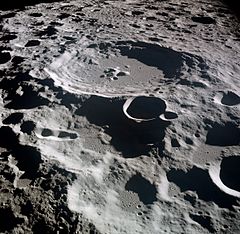Daedalus (crater)
 The lunar farside crater Daedalus from Apollo 11 (NASA photo) | |
| Coordinates | 5°54′S 179°24′E / 5.9°S 179.4°ECoordinates: 5°54′S 179°24′E / 5.9°S 179.4°E |
|---|---|
| Diameter | 93 km |
| Depth | 3.0 km |
| Colongitude | 181° at sunrise |
| Eponym | Daedalus |


Daedalus is a prominent crater located near the center of the far side of the Moon. The inner wall is terraced, and there is a cluster of central peaks on the relatively flat floor. Because of its location (shielded from radio emissions from the Earth), it has been proposed as the site of a future giant radio telescope, which would be scooped out of the crater itself, much like the Arecibo radio telescope, but on a vastly larger scale.
The crater is named after Daedalus of Greek myth. It is pictured in famous photographs taken by the Apollo 11 astronauts. In contemporary sources it was called Crater 308 (this was a temporary IAU designation that preceded the establishment of far-side lunar nomenclature).[1]
Nearby craters of note include Icarus to the east and Racah to the south. Less than a crater diameter to the north-northeast is Lipskiy.
Satellite craters[]
By convention these features are identified on lunar maps by placing the letter on the side of the crater midpoint that is closest to Daedalus.
| Daedalus | Latitude | Longitude | Diameter |
|---|---|---|---|
| B | 4.1° S | 179.8° W | 23 km |
| C | 4.1° S | 178.9° W | 68 km |
| G | 6.6° S | 177.4° W | 33 km |
| K | 8.3° S | 178.5° W | 24 km |
| M | 8.1° S | 179.5° E | 13 km |
| R | 7.7° S | 175.2° E | 41 km |
| S | 6.8° S | 172.9° E | 20 km |
| U | 4.2° S | 174.9° E | 30 km |
| W | 3.5° S | 177.5° E | 70 km |
See also[]
- 1864 Daedalus, near-Earth asteroid
References[]
- Graham-Rowe, Duncan (2002-01-03). "Astronomers plan telescope on Moon". New Scientist. Retrieved 2006-10-25.
- Andersson, L. E.; Whitaker, E. A. (1982). NASA Catalogue of Lunar Nomenclature. NASA RP-1097.
- Blue, Jennifer (July 25, 2007). "Gazetteer of Planetary Nomenclature". USGS. Retrieved 2007-08-05.
- Bussey, B.; Spudis, P. (2004). The Clementine Atlas of the Moon. New York: Cambridge University Press. ISBN 978-0-521-81528-4.
- Cocks, Elijah E.; Cocks, Josiah C. (1995). Who's Who on the Moon: A Biographical Dictionary of Lunar Nomenclature. Tudor Publishers. ISBN 978-0-936389-27-1.
- McDowell, Jonathan (July 15, 2007). "Lunar Nomenclature". Jonathan's Space Report. Retrieved 2007-10-24.
- Menzel, D. H.; Minnaert, M.; Levin, B.; Dollfus, A.; Bell, B. (1971). "Report on Lunar Nomenclature by the Working Group of Commission 17 of the IAU". Space Science Reviews. 12 (2): 136–186. Bibcode:1971SSRv...12..136M. doi:10.1007/BF00171763. S2CID 122125855.
- Moore, Patrick (2001). On the Moon. Sterling Publishing Co. ISBN 978-0-304-35469-6.
- Price, Fred W. (1988). The Moon Observer's Handbook. Cambridge University Press. ISBN 978-0-521-33500-3.
- Rükl, Antonín (1990). Atlas of the Moon. Kalmbach Books. ISBN 978-0-913135-17-4.
- Webb, Rev. T. W. (1962). Celestial Objects for Common Telescopes (6th revised ed.). Dover. ISBN 978-0-486-20917-3.
- Whitaker, Ewen A. (1999). Mapping and Naming the Moon. Cambridge University Press. ISBN 978-0-521-62248-6.
- Wlasuk, Peter T. (2000). Observing the Moon. Springer. ISBN 978-1-85233-193-1.
External links[]
| Wikimedia Commons has media related to Daedalus (crater). |
- LQ23 quadrangle
- Impact craters on the Moon
